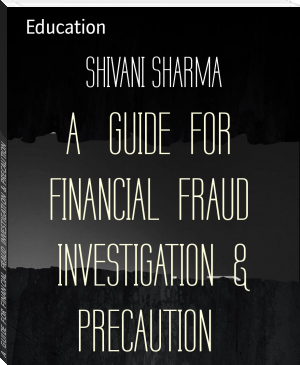A GUIDE FOR FINANCIAL FRAUD INVESTIGATION & PRECAUTION by SHIVANI SHARMA (thriller books to read txt) 📖

- Author: SHIVANI SHARMA
Book online «A GUIDE FOR FINANCIAL FRAUD INVESTIGATION & PRECAUTION by SHIVANI SHARMA (thriller books to read txt) 📖». Author SHIVANI SHARMA
Computer Viruses
Most criminals take advantage of viruses to gain unauthorized access to systems and steal important data. Mostly, highly-skilled programs send viruses, malware, and Trojan, among others to infect and destroy computers, networks, and systems. Viruses can spread through removable devices and the internet.
Ransomware
Ransomware is one of the most destructive malware-based attacks. It enters your computer network and encrypts files and information through public-key encryption. In 2016, over 638 million computer networks are affected by ransomware. In 2017, over $5 billion is lost due to global ransomware.
DDoS Attack
DDoS or the Distributed Denial of Service attack is one of the most popular methods of hacking. It temporarily or completely interrupts servers and networks that are successfully running. When the system is offline, they compromise certain functions to make the website unavailable for users. The main goal is for users to pay attention to the DDoS attack, giving hackers the chance to hack the system.
Botnets
Botnets are controlled by remote attackers called “bot herders” in order to attack computers by sending spams or malware. They usually attack businesses and governments as botnets specifically attack the information technology infrastructure. There are botnet removal tools available on the web to detect and block botnets from entering your system.
 Spamming
Spamming
Spamming uses electronic messaging systems, most commonly emails in sending messages that host malware, fake links of websites, and other malicious programs. Email spamming is very popular. Unsolicited bulk messages from unfamiliar organizations, companies, and groups are sent to large numbers of users. It offers deals, promos, and other attractive components to deceive users.
Phishing
Phishers act like a legitimate company or organization. They use “email spoofing” to extract confidential information such as credit card numbers, social security number, passwords, etc. They send out thousands of phishing emails carrying links to fake websites. Users will believe these are legitimate, thus entering their personal information.
Social Engineering
Social engineering is a method in which cybercriminals make a direct contact with you through phone calls, emails, or even in person. Basically, they will also act like a legitimate company as well. They will befriend you to earn your trust until you will provide your important information and personal data.
Malvertising
Malvertising is the method of filling websites with advertisements carrying malicious codes. Users will click these advertisements, thinking they are legitimate. Once they click these ads, they will be redirected to fake websites or a file carrying viruses and malware will automatically be downloaded.
Cyberstalking
Cyberstalking involves following a person online anonymously. The stalker will virtually follow the victim, including his or her activities. Most of the victims of cyberstalking are women and children being followed by men and pedophiles.
Software Piracy
The internet is filled with torrents and other programs that illegally duplicate original content, including songs, books, movies, albums, and software. This is a crime as it translates to copyright infringement. Due to software piracy, companies and developers encounter huge cut down in their income because their products are illegally reproduced.
 Child Pornography
Child Pornography
Porn content is very accessible now because of the internet. Most countries have laws that penalize child pornography. Basically, this cybercrime involves the exploitation of children in the porn industry. Child pornography is a $3-billion-a-year industry. Unfortunately, over 10,000 internet locations provide access to child porn.
Cyberbullying
Cyberbullying is one of the most rampant crimes committed in the virtual world. It is a form of bullying carried over to the internet. On the other hand, global leaders are aware of this crime and pass laws and acts that prohibit the proliferation of cyberbullying.
ImprintPublication Date: 02-06-2019
All Rights Reserved
Dedication:
ITS MY OWN NOTES
 The desire to acquire knowledge about the surrounding world and human society is quite natural and understandable for a person. Life is so developed that an uneducated person will never occupy a high position in any field. Humanity in its mass, and each person individually, develops objectively, regardless of certain life circumstances and obstacles, but with different intensity. The speed of development depends on the quality of training.
The desire to acquire knowledge about the surrounding world and human society is quite natural and understandable for a person. Life is so developed that an uneducated person will never occupy a high position in any field. Humanity in its mass, and each person individually, develops objectively, regardless of certain life circumstances and obstacles, but with different intensity. The speed of development depends on the quality of training.




Comments (0)